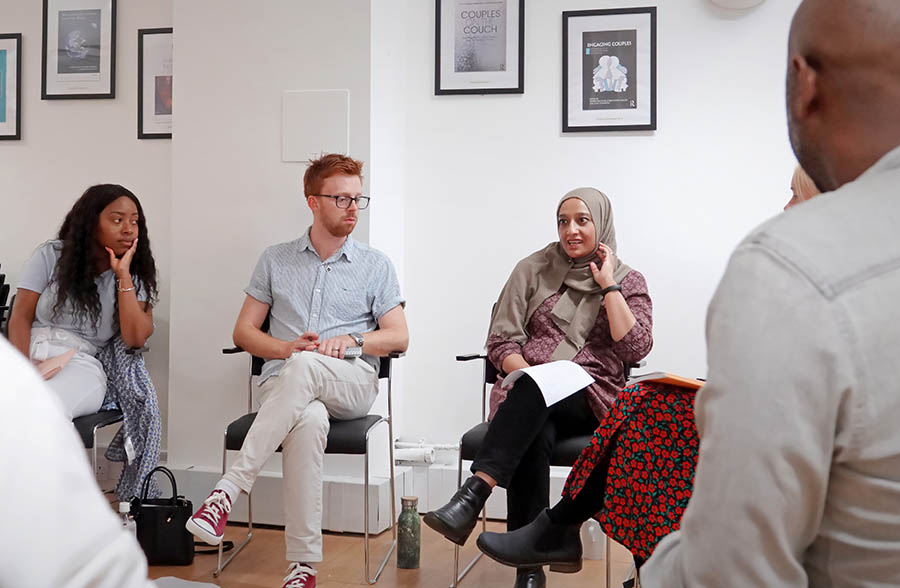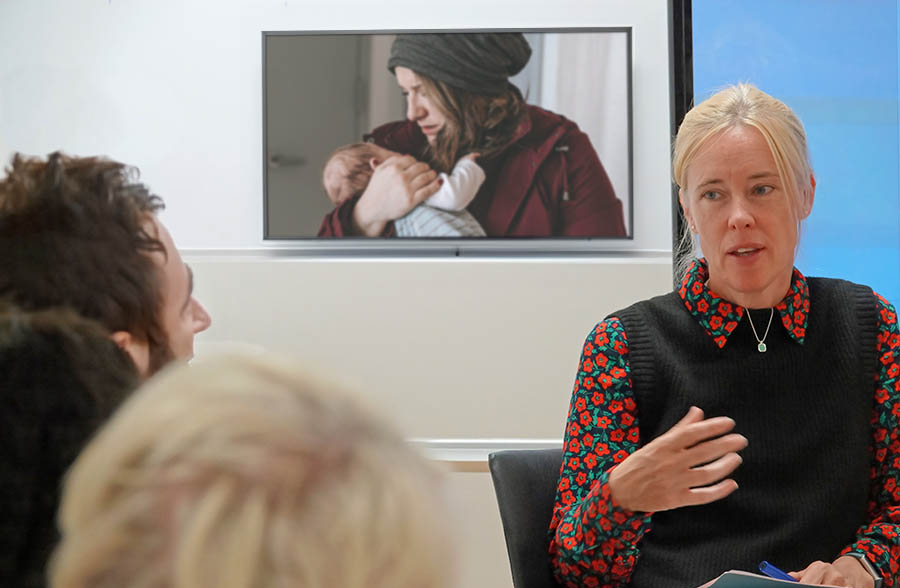- Psychotherapy Training

Upcoming training dates
London practitioner training: 22-26 January 2024
Leeds practitioner training: 18-22 March 2024
Get in touch with us
For any queries please email
Key information
Location:
London training: First two days in person in London followed by three days online
Leeds training: First two days in Leeds followed by three days online
Next course dates:
London practitioner training: 22-26 January 2024
Leeds practitioner training: 18-22 March 2024
Fees:
£3,750 includes 5 day training and 20 sessions of fortnightly supervision
(Funding may be available via NHSE for professionals who meet the eligibility criteria, i.e. professionals working within a Perinatal Service, an NHS Talking Therapies Service or those working within a charitable organisation able to access their clinical work through an NHS Talking Therapies Service.)
Application deadline:
TBC
Overview
The 5-day intensive training will cover the competencies required to be qualified as a CTfD - Perinatal Focus practitioner with a syllabus tailored to support couples in the perinatal period.
The 5-day training is followed by 8 to 12 months of clinical work.
About Couple Therapy for Depression with a Perinatal Focus
Based on NICE guidelines, Couple Therapy for Depression (CTfD) is a behavioural treatment for depression for couples where one or both partners are experiencing relationship distress and depression. The model is evidence-based and NICE recommends it is delivered in 16-20 sessions.
CTfD has been specifically adapted for perinatal services where there is depression in one or both partners, and a relational focus and support in adapting to parenthood is required.
CTfD with a Perinatal Focus has been developed by identifying best practice in a range of behavioural, systemic, psychodynamic, cognitive and emotionally focussed couple therapies evidenced in RCT effectiveness trials. CTfD with a Perinatal Focus focuses on relational aspects of a diagnosis of depression, on difficulties couples may experience pre, during and post the birth of children, and on factors that reduce stress and increase support within the couple, using the relationship as a resource for recovery and relapse prevention.
Content
Day 1
Introduction to the relational aspects of depression and working therapeutically with a couple as opposed to an individual:
- How to identify signs of depression and anxiety in both halves of the couple during the perinatal period
- How to engage the ‘non-birthing’ partner
- How to engage couples from different cultural, ethnic, gender and sexual orientations
Overview of physical and emotional changes couples face during the perinatal period:
- Introduction to the impact on the couple relationship facing fertility issues
- Transition to parenthood - developmental changes in relational dynamics when a third, a child, is introduced. Particular emphasis on changes during the crucial first 6 weeks of the infant’s life and, subsequently, the first 6 months. This will include thinking about the impact on a couple of having a baby with special needs
- Introduction to thinking with a couple about relational patterns, tracing these back to families of origin and possible childhood trauma
- Introduction to loss and mourning for couples around perinatal issues
Day 2
Assessment and formulation including:
- Impact on birthing partner and non-birthing partner’s mental health directly related to being pregnant and having a baby, encompassing perinatal losses that may have occurred
Assessment of risk:
- suicidality, DVA, birth trauma, self-harm, substance misuse, post-natal psychosis, children at risk
Working with the couple and the baby in the room and maintaining a balanced outlook.
- Impact on the couple from family and societal modelling including parents’ family histories
- Understanding of the defensive relational patterns relating to perinatal issues
Developing empathic joining, promoting acceptance and tolerance:
- techniques to encourage empathic joining within the couple relationship around their feelings on pregnancy, birth and the early months of their baby’s life
- techniques to develop capacity to tolerate difference and separateness as parents
- techniques to develop capacity to accept the other as different, but also situations which cannot be changed related to perinatal issues
Day 3
Working with and managing feelings in both partners
- Adapting to life with a new baby – individual styles of attachment and techniques for working with couples to encourage an increase or renewed communication between them
- Understanding and working with couple conflict in the room, including the therapist’s role and stance around perinatal issues
- MBT techniques for dealing with couple conflict and distress
- Impact on the therapist in working with perinatal issues.
Day 4
Coping with stress and anxiety
- Practitioners will be skilled to think with couples about increases in stress and anxiety during the perinatal period. Left unattended, these stressors, big and everyday, can lead to increased distance between partners and feelings of rejection and loss
- Techniques to activate behavioural exchange and reactivate closeness within the couple as romantic partners as well as a parental couple
Day 5
Working on understanding how problems, even if experienced only by one partner, will impact and create difficulties in the other.
Problem solving techniques:
- Techniques to facilitate one partner asking for support. Awareness of possible splitting within the couple relationship around care of an infant, including a competence/non-competence split
- Techniques to help the couple creatively explore possible solutions to a problem together
Thinking about sex:
- Physical changes during the pregnancy and the delivery
- Physical recovery period lasting two years post-partum
- Possible losses on both sides of the couple relationship related to libido, sexual intimacy
Ending therapy:
- Reflecting on the journey and celebrating the progress
- Mourning the end of the work and the disappointment of what has not been achieved
- Possible referral to other specialist services
Entry requirements
- To work within a Perinatal Service, an NHS Talking Therapies Service or Family Hub, or be able to access clinical work through an NHS Talking Therapies service
- Professional qualification of those eligible to apply include clinical psychologists, counselling psychologists, counsellors, psychotherapists (systemic, psychodynamic, psychoanalytic, integrative, person-centred, CBT, IPT/DIT)
- Applicants need to have eligibility for registration with either BPS, UKCP, BACP, BABCP, COSRT, HCPC and AFT
Clinicians need to evidence:
- An interest in developing and extending their practice to work with couples during the perinatal period where one or both are diagnosed with depression
- Written support for their application from service manager and clinical supervisor
- At least 100 clinical hours with individuals, families or couples
- To be able to access appropriate couple referrals from the outset of the course. We recommend carrying approximately 3-4 couple cases during the assessment and supervision component of the training
FAQs
Q How will I be supervised?
This CPD course is made up of 5 days of formal teaching and 20 sessions of remote supervision, for approximately 8-12 months. Please note that 100% attendance is required for the 5 days of teaching and a minimum of 80% attendance for supervision.
Q How will I pass the course?
Trainees will be expected to:
- Participate in 5 days of formal teaching and 20 fortnightly supervision sessions across approximately 8-12 months. This will be facilitated by the training team and training consultants
- Submit 5 digital audio recordings of therapy sessions, of approximately 2-4 couple. Training cases will also be explored in assessment supervision. Supervision will be conducted in groups and requires video conferencing, which Tavistock Relationships will facilitate
- A limited amount of written work and self-reflection on learning and development of practice
Q I’m really interested in couple therapy but have little experience of working with couples. Can I join the practitioner training?
Yes, the training is open to all counsellors and therapists working at Step 3 within a Perinatal Service, an NHS Talking Therapies Service or in the voluntary sector with a contract with the NHS, who have an interest in extending their practice to work with couples where one, or both, are diagnosed with depression. Access to couple referrals for training cases is essential. See Entry Criteria tab.
Q I’m a systemic therapist. Is this course suitable for me?
Yes – as long as you have relevant clinical experience (see Entry Criteria tab). Couple Therapy for Depression with a Perinatal Focus (has been developed by identifying best practice in a range of behavioural and other types of couple therapies evidenced in RCT effectiveness trials. It) is an integrative model and suitable for therapists and counsellors from a variety of training backgrounds. The training team welcomes applicants from a range of approaches to facilitate a rich learning experience.
Q Is this CPD or a training course?
Both! This is a training course in Couple Therapy for Depression with a Perinatal Focus (in NHS Talking Therapies Service Services) and those who complete the training will be competent to deliver this particular model as recommended by NICE. The course is described as CPD by the NHS because it is not itself a baseline therapy qualification – it is an add-on to an existing qualification. It includes assessment of clinical competences and it is possible to not pass the course.
Q My practice usually offers six sessions of therapy. Why does this model recommend 16-20 sessions?
We recommend 16-20 sessions because NICE have specified this number in their guidance for the treatment of depression by couple therapy and our model comes out of their guidance. We appreciate that ordinary clinical practice would make use of a range of number of sessions and we try to be pragmatic within the limits of the existing evidence base. On average, the Integrative Behavioural Couple Therapy literature that forms the backbone of the model suggests between 16-20 sessions and so we try to keep both this and the NICE criteria in mind. What we know about depression is that it is likely to reoccur and that it can be fatal. This makes the model slightly different to ordinary good-enough clinical work with couples. Not least, an important part of the therapy is to reinforce different techniques that couples can put into practice when there is a relapse. With an assessment phase of four sessions and an ending phase of around three sessions, it is clear that a therapy of only a few sessions more than this is unlikely to cover all the things that a couple may need to relieve their distress and keep them safe in the longer-term.
Funding
- The training is funded by NHSE for professionals who meet the eligibility criteria, i.e. professionals working within a Perinatal Service, an NHS Talking Therapies Service or those able to access their clinical work through an NHS Talking Therapies Service.
- We also welcome applicants from Perinatal Service and NHS Talking Therapies Service unable to access NHSE funding, but able to finance the training.
How to apply for this course
Click on the button for your region to apply online.
Apply for London 5-day Practitioner Training
Apply for Leeds 5-day Practitioner Training
Enquire about this course
Note: Please make sure to select the correct course from the 'Range of Courses' dropdown menu in the form below.
Course leader
Student testimonials
Read more …Couple Therapy for Depression with Perinatal Focus - 5-day Practitioner Training












